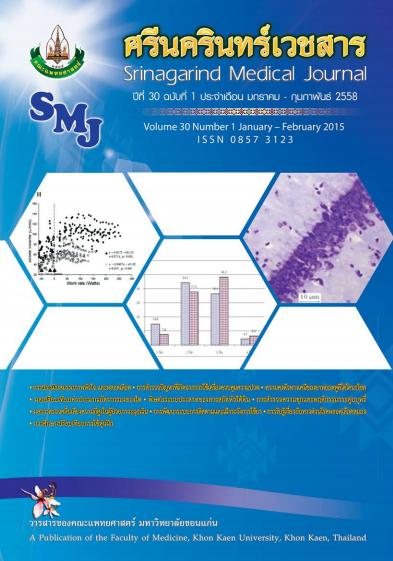Evaluation of Cardiovascular Performance during Incremental Exercise Testing in Healthy Thais
Keywords:
Cardiopulmonary exercise testing, cardiovascular responsesAbstract
Introduction: Cardiopulmonary exercise testing (CPET) has been a promising utility for performance, and physiological and valuable clinical assessment in patients at high risk for respiratory and cardiovascular diseases. Reference values for cardiovascular responses to the CPET in healthy Thais have never been studied. This study aimed to evaluate cardiovascular responses at maximal exercise in 30 healthy Thai subjects (15 males, 15 females); aged between 20-40 years.
Materials and Methods: Healthy Thais volunteers underwent the CPET by using a treadmill ramp protocol and symptom limited.
Results: Oxygen pulse ( ), cardiac output ( ) and stroke volume (SV) at maximal exercise in males were significantly higher than in females by 65.9%, 71.7% and 66.6% (p<0.001), respectively. Nevertheless, heart rate reserve (HRR) and heart rate (HR) at maximal exercise were not significantly different between genders. Moreover, HR, and increased proportionally to an increased work rate (WR) in both genders (female; r= 0.84, r= 0.62 and r= 0.79, p<0.001 & male; r= 0.91, r= 0.83 and r= 0.81, p<0.001). Nonetheless, SV and responses to WR below 150 watts were relatively lower in females than in males. The HR, response was higher in females than males.
Conclusions: The present study suggests that although cardiovascular responses increase with increased WR, they are different between genders. It is necessary to conduct a study in a large population so that reference values can be established for Thais.




